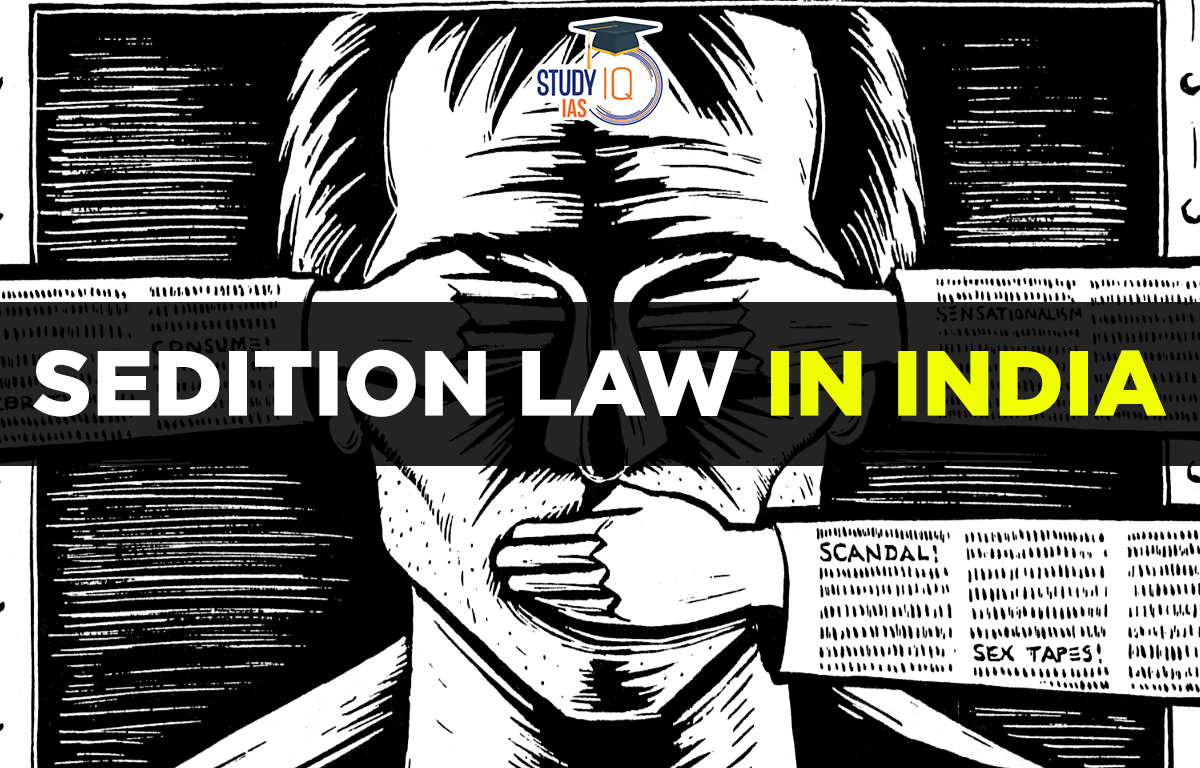Table of Contents
Context: The Union government has conveyed to the Supreme Court that it has initiated the process for reexamining the sedition law (Section 124A of IPC).
Sedition Law in India Background
- In May 2022, the apex court had suspended the use of Section 124A, stalling pending criminal trials and court proceedings under the section across the country.
- However, allegations were made by petitioners that arrests and prosecutions under Section 124A were continuing despite the freeze.
- The government has reiterated that examinations are in advanced stage and the final shape may be given to the exercise ahead of the next Parliament session.
What is Sedition?
- Sedition under IPC 124A is defined as an attempt to bring in hatred or contempt or excites or attempts to excite disaffection towards the government established according to the law.
- The expression “disaffection” includes disloyalty and all feelings of enmity;
- Comments expressing disapprobation of Government measures with a view to obtain their alteration by lawful means, without exciting hatred, contempt or disaffection, will not constitute an offence under this section;
- Comments expressing disapprobation of the administrative or Government action without exciting hatred, contempt or disaffection, will not constitute an offence under this section.
- Sedition was included as an offence in 1890 under section 124A IPC through the Special Act XVII.
- Punishment:
- It is a non-bailable law that is punishable with imprisonment from three years up to life, along with a fine.
- Individual charged under the law will be barred from a government job and their passport is seized by the government.
- Origin of sedition law:
- Sedition comes under Section 124A Indian Penal Code (IPC). The law was drafted by British historian-politician Thomas Babington Macaulay in 1837.
- The British colonial government used the law to primarily suppress the writings and speeches of prominent Indian freedom fighters.
- Mahatma Gandhi, Lokmanya Tilak, and Jogendra Chandra Bose were some of the leaders who were charged under the law, for questioning colonial administration.
- During process of constitution framing, the sedition law was opposed by members of Constitutional Assembly, such as K.M. Munshi, who argued that such a draconian law is a threat to democracy in India.
- The word sedition was omitted from the Constitution due to the persistent efforts of Bhupinder Singh Mann.

Stats IQ: Sedition cases in India
- NCRB data shows that sedition cases have risen from 47 in 2014 to 93 in 2019, a massive growth of 163 percent.
- Conviction rate: The conversion rate from cases to conviction is a mere 3 percent.
- Highest cases: Assam (76), Haryana (42 cases), Jharkhand (40), Karnataka (38), Andhra Pradesh (32) and Jammu and Kashmir (29).
- These states accounted for more than half the number of total sedition cases recorded in the country.
- Substantial cases: Manipur (28), Uttar Pradesh (27), Bihar (25), Kerala (25), Nagaland (17), Delhi (13), Himachal Pradesh (12), Rajasthan (12) and West Bengal (12) registered cases in double digits.
- Zero cases: Meghalaya, Mizoram, Andaman and Nicobar Islands, Chandigarh, Dadra and Nagar Haveli and Daman and Diu, and Puducherry did not register any sedition cases.
Judicial Opinion on Sedition Law
- The Supreme Court in Romesh Thapar vs. State of Madras (1950) held that criticism of the government exciting disaffection or bad feelings towards it cannot be regarded as a justifying ground for restricting the freedom of expression and of the press.
- In Gopi Chand vs. The State (1951), and Ram Nandan vs. State of Uttar Pradesh (1959), courts declared that Section 124A of the IPC was unconstitutional.
- The Supreme Court in Kedar Nath Singh vs State of Bihar (1962) gave constitutional validity to sedition law.
- The court however said that unless accompanied by an incitement or call for violence, criticism of the government should not be called sedition.
- In Balwant Singh vs. State of Punjab (1995), the Supreme Court said that the real intent of the speech must be taken into account before labeling it seditious.
- In Rajat Sharma vs. the Union of India Case, 2021, the court ruled that disagreeing with the views and policies of the government will not be considered sedition.
- In Disha Ravi case, the Delhi High Court ruled that government cannot imprison citizens because of disagreeing with the state policies.
- In Farooq Abdullah case, the judiciary observed that expression of views of dissent, which is different from the opinion of the government, cannot be termed seditious.
Criticism of Sedition Law
- Violation of freedom of speech: Fundamental Right of freedom of speech is violated by the sedition law. This is considered a threat to democracy.
- Poorly defined: Assessing the exact nature of speech that can be considered sedition is very difficult due to the poor definition of the law. Distinguishing genuine expression of speech from seditious speech will be challenging.
- Misuse: There have been numerous instances where governments have misused the sedition law to curb dissent. Political opponents, journalists, social activists etc have been victims of the sedition law.
- Colonial legacy: Sedition law is a colonial legacy, which was used mainly to overcome popular movement. It is thus appropriate to give up this colonial burden.
- Regular invoking: Sedition law was supposed to be an extraordinary instrument that was to be used only when security and sovereignty of the country is threatened. However, it is invoked quite regularly, even on flimsy grounds.
- Low conviction: The conviction rate of sedition law is about 3%. This shows that the law is mainly used to create fear and silence any criticisms or dissent.
Support for Sedition Law
- Territorial integrity: The law will help in tackling anti-national, secessionist and terrorist elements that threaten territorial integrity of the nation.
- Reasonable restriction: The Constitution allows reasonable restriction on freedom of speech and expression. This does not violate the fundamental rights.
- Stabilizing state: The sedition law protects the elected government from attempts to overthrow it using violence and illegal means.
Way Forward
- Democracy requires active participation of citizens in decision making process, including constructive criticisms of government policies.
- Sedition law has empowered the executive to use this ambiguous provision as an instrument to regulate public opinion and indiscriminately wield power.
- The need of the hour is to review this draconian law. Even if the law is not completely abolished, there must be checks and balances imposed so as to reduce the misuse.


 Serious Fraud Investigation Office (SFIO...
Serious Fraud Investigation Office (SFIO...
 Article 142 of Indian Constitution, Sign...
Article 142 of Indian Constitution, Sign...
 Pakistan-Occupied Kashmir (PoK): History...
Pakistan-Occupied Kashmir (PoK): History...





















